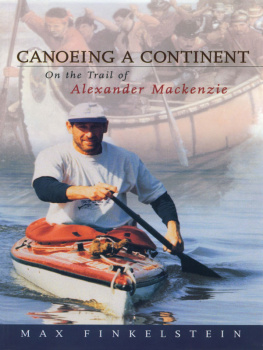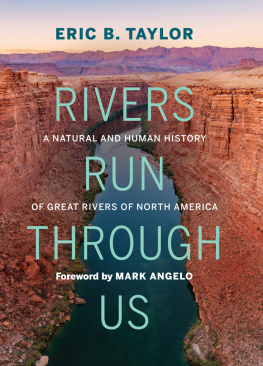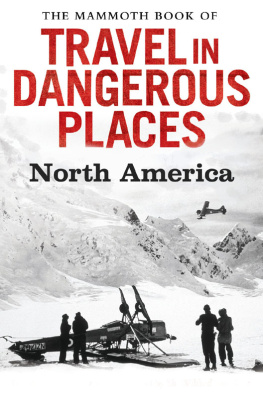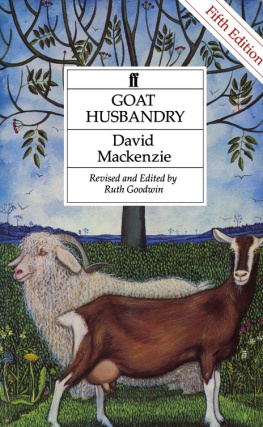Canoeing a Continent:
On the Trail of Alexander Mackenzie
MAX FINKELSTEIN

NATURAL HERITAGE BOOKS
Canoeing a Continent: On the Trail of Alexander Mackenzie
Max W. Finkelstein
Copyright 2002 Maxwell W. Finkelstein
Second printing March 2005
All rights reserved. No portion of this book, with the exception of brief extracts for the purpose of literary or scholarly review, may be reproduced in any form without the permission of the publisher.
Published by Natural Heritage / Natural History Inc.
P.O. Box 95, Station O, Toronto, Ontario M4A 2M8
www.naturalheritagebooks.com
National Library of Canada Cataloguing in Publication Data
Finkelstein, Max
Canoeing a continent: on the trail of Alexander Mackenzie
Includes bibliographical references and index.
ISBN I-896219-00-4
I. Finkelstein, Max Journeys Canada. 2. Mackenzie, Alexander, Sir, 17641820. 3. Alexander Mackenzie Voyageur Route. 4. Northwest, Canadian Discovery and exploration. 5. Canada Description and travel. 6. Canoes and canoeing Canada. I. Title.
FC3212.1.M46F56 2002 917.104 C2002-901033-0
F1060.7.M1783F56 2002
Cover and text design by Sari Naworynski
Edited by John Parry and Jane Gibson
Printed and bound in Canada by Hignell Printing Limited, Winnipeg, Manitoba

Natural Heritage / Natural History Inc. acknowledges the financial support of the Canada Council for the Arts and the Ontario Arts Council for our publishing program. We also acknowledge the financial support of the Government of Canada through the Book Publishing Industry Development Program (BPIDP) and the Association for the Export of Canadian Books.
To my father and mother my navigators and the
shapers of my life who taught me to look for happiness
only where it might be found
and to Connie my One True Love and my guiding
beacon from near and afar.
From there to here.
From here to there,
Funny things are everywhere.
Dr. Seuss
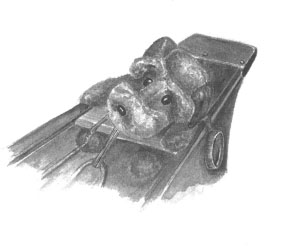
This is one fantastic tale about two incredible journeys written by one extraordinary paddler.
Kevin Callan, Canoeist and Author, Peterborough, Ontario 2
A must-read for everyone who loves wild places and the magic of canoes.
Cliff Jacobson, Outdoor Writer & Consultant, River Falls, Wisconsin
Contents
Preface
20. Sturgeon-Weir: The Road Home
21. Reflections
Notes
Max Finkelstein has provided us with a unique gift of Canadiana. His inspired record of Alexander Mackenzies voyages has been gracefully interwoven with the story of his own journeys along the same route two hundred years later. Although some aspects have not changed, Max is able to identify many details that are quite different. Weather conditions, equipment, purposes of the voyages and more recent human interventions such as dams and hydro installations are all important alterations, and he is able to point to these in a fascinating and revealing way.
In his absorbing and thoughtful work, Max reveals the inspiration he has gained from his voyages. The descriptions he has so ably recorded are of an artist expressing himself in carefully selected word pictures. At the same time, he makes us vividly aware of the sheer torture that was endured by voyageurs who toiled in the fur trade. The life of a trader was most often traumatic and indeed marked by incredible hardship. Unpredictable weather, insects, poor food, inadequate equipment and other factors were the daily lot of those intrepid paddlers. Max Finkelstein shared many of these same discomforts and speaks with some authority on the trauma of their experience in the arms of great canoes. The one obvious advantage, if any, was that in Mackenzies time the long trail was experienced by groups of paddlers, but Max accomplished much of the journey on his own. This fact adds a significant dimension to his adventure.
The route that Mackenzie navigated is no longer as obvious as it was at one time, and Max was forced at times to engage in a process of logic and deduction to determine his way. His reference to Cedar Lake, with the search for the mouth of the Saskatchewan River, is a good example.
Throughout his remarkable record of their story and my story, it becomes increasingly obvious that the magnitude of Mackenzies explorations is not generally understood or appreciated. By the same token, the voyages of Max Finkelstein and the consequent revelation of Mackenzies exploits tend to help readers grasp the outstanding effort put forward in traversing this vast and varied land en route to the Pacific Ocean.
For recreational paddlers or for those who aspire to undertake more extended canoe journeys, or indeed for those who dream about the great treasure of Canadian waterways, Maxs work must be a source of inspiration, especially for Canadians. It is not only a tribute to Alexander Mackenzie, but also a stirring reference to the lives of those who travelled the same waterways for untold centuries before that is, the people of the First Nations. They knew so well those aquatic highways for such a long time. Because of their knowledge and experience, the challenges of the wilderness faced by explorers, although still tough, became much less rigorous.
By his own declaration, Max observed that he had witnessed first-hand much more of Canada as it used to be seen. By innuendo he also suggested that it can be seen again by paddlers who wish to feel what it is to be Canadian. This privilege, of course, is partially dependent on our willingness to ensure the health and welfare of our waterways. These arteries of life now need our protection and support if they are to survive the onslaughts of the New World. Abuse and overuse coupled with indifference has profoundly affected our water. Although in some regions, the deteriorating condition of our water resources is obvious, it is not too late to restore our great national treasure to better health now and for the future.
Kirk Wipper CM
Professor Emeritus, University of Toronto
I received a lot of help from many people both before I started and along the way. I would like to thank my friend Michael Greco, president of the Canadian River Management Society, for his unwavering enthusiasm and support; Bob Hellman of Hellman Canoes, for providing the tanden canoe that I used on the journey; Beth and Michael Peterson (sadly, Michael died of cancer during my trip, a great loss to the canoeing community) of Ottawa Valley Canoe, for helping me to acquire Loon many years ago and encouraging me to pursue my paddling endeavours: Wally Schaber and the staff at Trailhead in Ottawa, who have worked hard to promote canoeing in Canada and encouraged me in all my canoeing endeavours; Don Gibson, National Manager, Canadian Heritage Rivers Systems (CHRS), for his understanding and patience during my absences from my position with the CHRS and for doing the work of two people while I gallivanted across the country; and Wayne Roach, also of the CHRS, who gave me unwavering support and helped fill in while I was absent.
I would like to thank every person who helped me along the way. A dry place to sleep at night, a hot cup of coffee on a cold, rainy day, an encouraging wave, a friendly hello it all helped enormously. I also thank Alexander Mackenzie and all the other fur traders, explorers, dreamers and adventurers who blazed a trail for me to follow.
Next page
